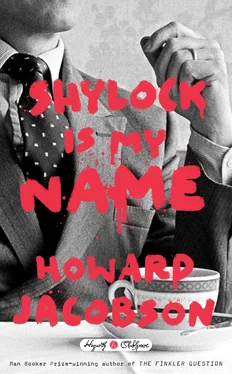No response now from her fingers. If she had felt what he’d felt she’d dealt with it, shut herself down again because that was the only way any of it could be borne.
“Yes,” he said. “We’ll wait and see what my visit yields.”
He continued to sit with his head down, letting the cold air graze his cheeks. He owed the woman whose dead hand he held in his some recompense. She’d given him a few years of happiness. She’d given him a daughter. She’d helped seal the rift between him and his father and in that and many other ways she’d improved his relations with his mother too. More people to whom he owed recompense. Over a year had gone by now since his mother died and what had he done to honour her memory? He’d allowed the plan to open a gallery in his parents’ names to lapse. He’d put up little or no fight against D’Anton. He was a defeatist — an on-again off-again everything, son, father, husband, defender of the faith. In tearing at himself, his soul hardened against D’Anton.
Was there more soul-hardness to feel against D’Anton than he already felt? A soul can always harden more.
D’Anton: the Jew-hater who had stolen his daughter, interfered in the expression of his love for his parents, and bore responsibility — by implication, by association, by retrospective malice, by the simple fact of his sort existing — for the wreckage that was his wife.
“If I could kill him I would kill him,” he told her.
He thought he saw alarm in her eyes. He imagined that she shook her head. Don’t, Strulo!
If only.
“Then if you don’t think I should, I won’t,” he said.
The idea that D’Anton owed his life to Kay only made Strulovitch more murderous towards him in his heart.
—
The note, when Shylock handed it over, disgusted him. How did D’Anton manage to beg and yet not beg? By what power was he able to turn a grovel into an insult?
“If I could destroy him I’d destroy him,” he told Shylock. “But at least this way I will spill blood.”
Shylock shook his head. “I’d proceed carefully,” was his advice. “What D’Anton proposes neither brings back your daughter nor requites the footballer the wrongs he has done her.”
“What about the wrongs they have done me?”
Shylock looked away. It was as though he wanted to spare Strulovitch the fires burning in his eyes. “I fear you are putting yourself at the forefront of this,” he said. “It strikes me that you are allowing it to get too personal.”
“Too personal? What’s too personal?”
“Killing D’Anton is too personal.”
“Too personal for D’Anton maybe. Not for me.”
“But your argument is with the footballer.”
“That clown? For him I feel only a minor contempt.”
“Despite his violation of your daughter?”
“I know Beatrice. She is more than capable of leading a man on. And if he were to argue in a court of law that she struck him as ten years older than she was he’d as likely as not be believed.”
“I commend your forbearance. But why then your insistence on his return? If you can allow what happened a year ago, when it was illegal, why can’t you allow it now when the law has nothing to say against it?”
“She is still a child.”
“In fact, though hardly in appearance. Or in assurance come to that.”
“And he is still a Gentile. Didn’t you say of Jessica that you would rather any of the stock of Barabbas had been her husband than a Christian?”
“You take me out of context. Those Christian husbands were falling over one another to shed their wives, so they could rescue Antonio from my clutches. A father wants his daughter to marry a man who values her above his friends. It was more the loyalty they swore to one another than the icons they prayed to in church that rendered them undesirable. And anyway…”
“Anyway what?”
“Though I can no more reasonably regret than I can look forward, I do from time to time wonder whether I’d have been better advised to let her marry a Christian than lose her altogether.”
“That’s for you to ponder. As things stand with me, I neither have a daughter nor approve her choice of husband.”
“That could change if you signalled that you had changed.”
“If I welcomed them back with open arms, you say?”
“You needn’t throw wide your arms. A handshake would do as well.”
“And what would that handshake denote? That he’s forgiven? That I love him? That he may keep his foreskin?”
“It may have to be you who forgoes the foreskin.”
“You will deny me my merry jest?”
“I don’t deny you anything. The man presently cohabiting with your daughter denies you. Your daughter denies you. The opinion of the world denies you.”
“You forget D’Anton’s offer.”
“But how would circumcising D’Anton serve your purpose?”
“It would serve my jest.”
“Only in a spirit that would negate the jest.”
“Look into your own heart and you will know mine. I too have a black humour. My first wife told me that. My second wife has found a way of telling me something similar.”
“There is neither purpose nor profit in circumcising D’Anton.”
“It might not come to that. The threat of it might result in his returning me Gratan.”
“And if he doesn’t?”
“Then I will have my satisfaction.”
“This is exactly what they expect you to do.”
“Then I will give them what they expect and be gleeful in the doing of it. Their expectation won’t take from my gratification.”
“I repeat, you are allowing this to grow too personal.”
“Must I be denied my satisfaction?”
“If satisfaction is all it is. Yes.”
“Then I will change the word. Must I be denied my bond?”
Well that didn’t work out too badly, Shylock thought.
—
“If it were done when ’tis done then ’twere well it were done at my place,” Plurabelle had told Shylock.
She had rehearsed several times in front of the mirror before leaving home, knowing Strulovitch to be a fiery Shakespearean and hoping by this means to soften him into agreement and maybe even admiration. By the time she came to deliver the words she had realised it wasn’t Strulovitch who had opened the door to her, but she wasn’t going to waste them. Who exactly it was she was talking to she didn’t know, but his austere and belligerent demeanour declared him to be a person authorised to deal with whatever arose, a man privy to Strulovitch’s affairs, a lawyer, perhaps, given his dress, retained to advise on the very business that brought her here.
“Hasn’t too much already been done at your place?” Shylock had answered.
Yes, a lawyer fully conversant with the matter on which she’d called. Plurabelle had been in better spirits over the last hours than she had been for days, but a cold chill seized her now. If Strulovitch had employed and briefed a lawyer then the legal process to implicate her in scandal and turn her Utopian dream into a nightmare had begun in earnest.
Plurabelle had not spent a fortune plumping up her lips for nothing. She threw Shylock her most ravenous Venus flytrap smile. A beast in the courtroom he might be, but let him beware a flesh-eating beauty like her.
So much for Plury on the outside. Inside all was tumult.
Two ambitions fought within her breast. A) To keep all this as confidential as possible. B) To seek as much publicity as the disputants themselves would allow her. Though a deeply private person, Plurabelle was also a deeply public one. I have never lost by being indiscreet, she thought. I have always been applauded for my candour and sympathised with for my pain. On the side of confidentiality was the truism least said, soonest mended. On the side of publicity was the shaming of Strulovitch. How that was to be effected she wasn’t as yet entirely sure, but she was confident he would show up badly in any public confrontation and in the process discredit his own testimony. Who could blame Beatrice, or those who encouraged her, if she fled from such a father and sought affection in the arms of a man not ideal in every respect, it was true, but at least a man who loved her. Whether the other piece of information to which she was privy would discredit Strulovitch still further or simply make him look a fool she couldn’t say, but she anticipated either outcome with eagerness.
Читать дальше












